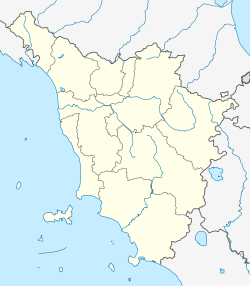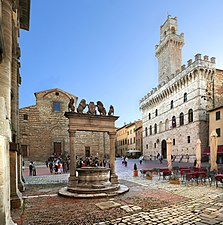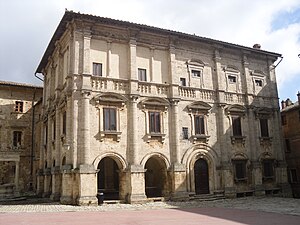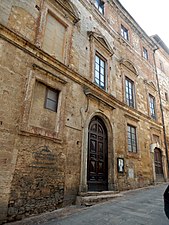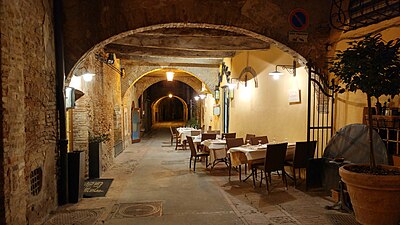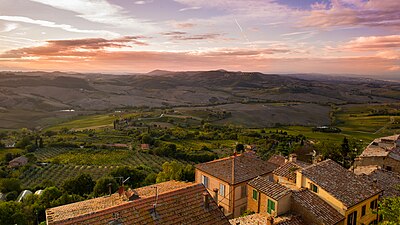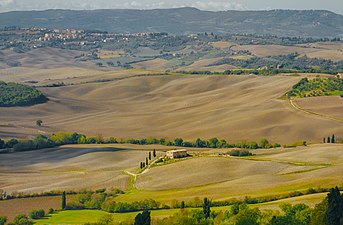|
Montepulciano
Montepulciano (Italian: [ˌmontepulˈtʃaːno]) is a medieval and Renaissance hill town and comune in the Italian province of Siena in southern Tuscany. It sits high on a 605-metre (1,985 ft) limestone ridge, 13 kilometres (8 mi) east of Pienza, 70 kilometres (43 mi) southeast of Siena, 124 kilometres (77 mi) southeast of Florence, and 186 kilometres (116 mi) north of Rome by car. Montepulciano is a wine-producing region. The Vino Nobile di Montepulciano has Denominazione di origine controllata e garantita status[3][4] and is, with the Brunello di Montalcino and Chianti Classico, one of the principal red wines of Tuscany. The Rosso di Montepulciano and Vin Santo di Montepulciano have Denominazione di origine controllata status.[3][4] HistoryAccording to legend, it was founded by the Etruscan King Lars Porsena of Clusium (modern Chiusi). Recent findings prove that a settlement was in existence in the 4th-3rd centuries BC. In Roman times it was the seat of a garrison guarding the main roads of the area. After the fall of the Western Roman Empire, it developed as a religious center under the Lombards. In the 12th century it was repeatedly attacked by the Republic of Siena, which the Poliziani faced with the help of the Perugia and Orvieto, and sometimes Florence, communes. The 14th century was characterized by constant struggles between the local noble families, until the Del Pecora family became rulers of the town. From 1390, Montepulciano was a loyal ally (and later possession[5]) of Florence and, until the mid-16th century, lived a period of splendour with architects such as Antonio da Sangallo the Elder, Jacopo Barozzi da Vignola, Baldassarre Peruzzi, Ippolito Scalza and others, building luxurious residences and other edifices here. In 1559, when Siena was conquered by Florence and Montepulciano lost its strategic role, its importance declined. After the unification of Italy and the drying of the Val di Chiana, the town remained the most important agricultural centre in the area, while the industrial activities moved mostly next to Chiusi, which was nearer to the railroad being built in that period. A competitive "barrel race through the city" called the Bravio delle botti has been held on the last Sunday of August since the 14th Century. Main sightsSince the Second World War, tourism has been a significant aspect in the economy of the urban part of the commune. Many of the streets are designated as car-free. Most of the shops and restaurants are on the main street, which stretches from Porta Al Prato to Piazza Grande[6] for 1.5 kilometres (0.9 mi). The main landmarks include:
Notable people
Municipal government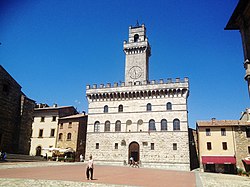 Montepulciano is headed by a mayor (sindaco) assisted by a legislative body, the consiglio comunale, and an executive body, the giunta comunale. Since 1995 the mayor and members of the consiglio comunale are directly elected together by resident citizens, while from 1945 to 1995 the mayor was chosen by the legislative body. The giunta comunale is chaired by the mayor, who appoints others members, called assessori. The offices of the comune are housed in a building usually called the municipio or palazzo comunale. Since 1995 the mayor of Montepulciano is directly elected by citizens, originally every four, then every five years. The current mayor is Michele Angiolini (PD), elected on 26 May 2019 with the 56.2% of the votes and re-elected on 9 June 2024 with 53.3% of the votes.
Twin towns—sister citiesMontepulciano is twinned with:
Gallery
See alsoReferences
External links
|
|||||||||||||||||||||||||||||||||||||||||||||||||||||||||||||||||||||||||||||||||




